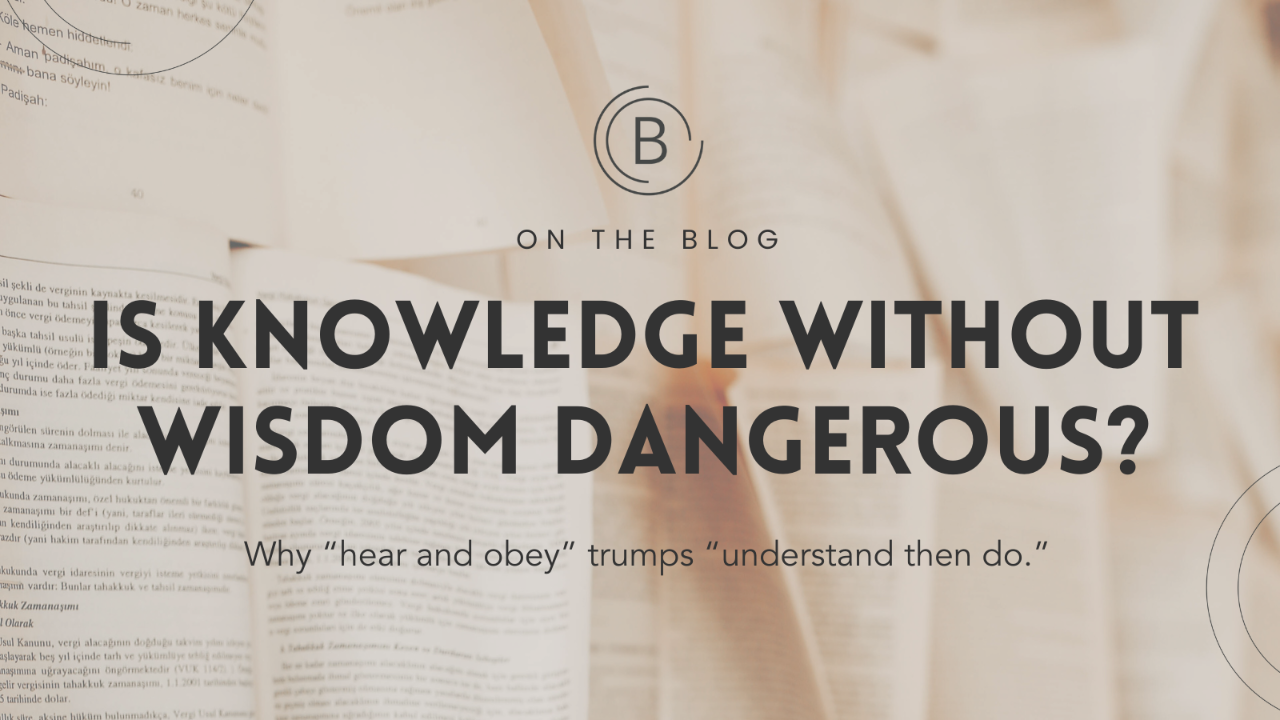Is Knowledge Without Wisdom Dangerous?
Jan 31, 2023
Why “hear and obey” trumps “understand then do.”
We are privileged to live in a world where we can google anything, question everything and become knowledgeable on topics quickly. But can this data-at-our-fingertips lifestyle prevent us from truly experiencing fulfillment in life? Jesus said, “Whoever hears these teachings of mine and obeys them is like a wise man…” It sounds so simple, like a line from a children’s song: “hear and obey.” Have we surpassed this? Since we generate more YouTube content in a day than what Jesus put out in his life, since we have amassed knowledge, since we now have science… does “hear and obey” actually stand up to modern standards?
I made a short list of why “hear and obey” is greater than “know and do.” There are self-help industries (that make people helpless) and social media influencers and university systems that grease the wheels of their economies on the premise that you must know before you do or have a better understanding before you change your lifestyle. But Jesus said, “Whoever…” [this is very inclusive] “hears these teachings of mine…” [which he sought to make clear and accessible] “and obeys them…” [and this is where we have the rub, the challenge, the issue.] Before we get to the typical pattern in modern society, let’s consider 10 reasons why “hear and obey” is a smart teaching:
- Hear and Obey leads to instant obedience which can be lifesaving in certain circumstances.
- Obedience leads to revelation.
- Revelation leads to understanding.
- Understanding appreciates the “good, acceptable, and perfect will of God” as wisdom that surpasses knowledge.
- Appreciation leads to praise.
- Praise leads to worship.
- Worship leads to intimacy.
- Intimacy results in security of identity and contentment.
- Contentment and security of identity keep the heart soft.
- Softness of heart keeps one ready to hear and obey.
Hunger to have a problem solved or know the truth or get answers to life’s questions can lead to one hearing in the first place. But a cycle of nearness to God is unsustainable without a continued posture of “hear and obey.”
By contrast, those who do not know or fear God can still do well and get ahead, but there is not the same peaceful rhythm to their lives because:
- They begin with a posture of questioning, “is this right, did I hear correctly, can it be true, etc.”
- They seek understanding before they will agree to action
- Action is delayed while they try to get more knowledge
- Increased knowledge (without action) can lead to pride (“knowledge puffs up”)
- They find a false security in knowing more than others
- They might ultimately find their identity in being part of an elite group that knows more than others (this could be a church or a university faculty or a think tank or a social group)…
- Still without an inch of action
- This changes heads but not habits
- Unchanged habits do not indicate changed hearts
- The wisdom of man apart from God usually does not change the world for the better
“Whoever hears these teachings of mine and obeys them is like a wise man who built his house on a rock.”
A studied and smart man said, after experiencing a new kind of insight and understanding, “the wisdom of God is foolishness to man.” At a heart level, we can either live in the world of “question and consider” or “hear and obey.” Pondering on the right side of obedience is wonderful. Questioning on the wrong side of obedience is perilous. Sadly, many universities promote head knowledge above experiential learning leaving them with concepts robbed of the power of life lived authentically. Students graduate with degrees, but on the wrong side of the Jordan. They may have knowledge of what a better world should look like but are ill-equipped to get there and live there. Human knowledge is not enough; godly wisdom gained by “hear and obey” is the key.
PS: Hear and obey is not a 10-step formula. Many who have gone down this road have been tested. They obeyed, but things did not work out quickly the way they had hoped. Sometimes years passed before they saw what they hoped for; at other times there were immediate outcomes. (I have found that the assistance I offer in serving others gets quicker outcomes than the prayers I pray for myself. The economy of God involves giving and receiving not grasping and gaining.) This does not invalidate the principle. Hearing and obeying mean we have a master, a boss, who can tell us what to do. This is offensive to our narcissistic “I did it my way” ears, and the more we pile knowledge on disobedience the greater our arrogance and the less likely our immediate “hear and obey.” But we can discover that true wisdom comes from yielding to greater knowledge, authority, and love.

